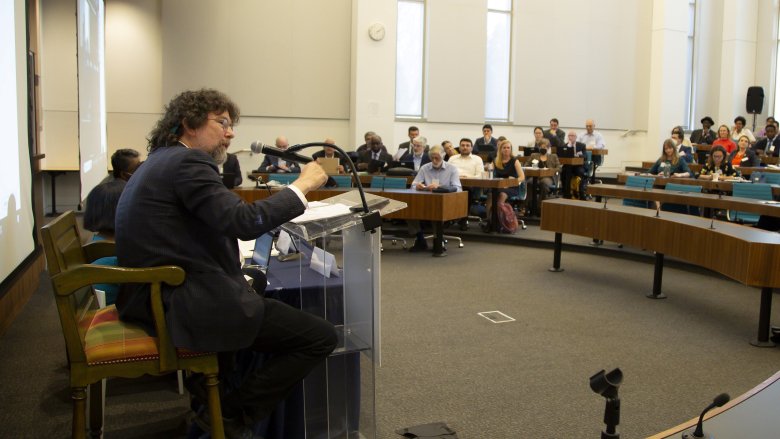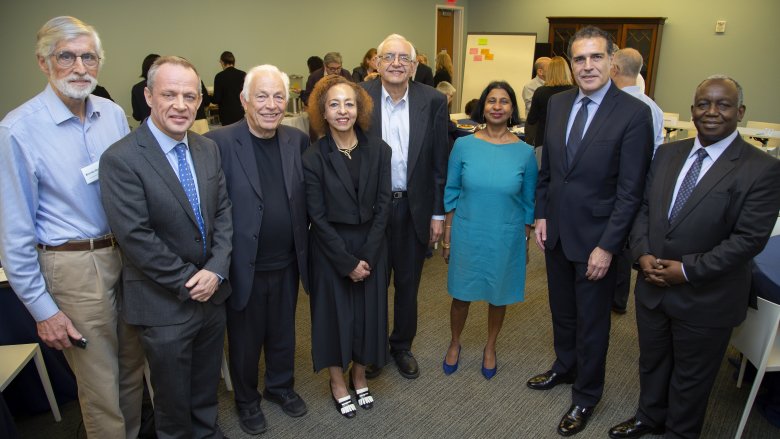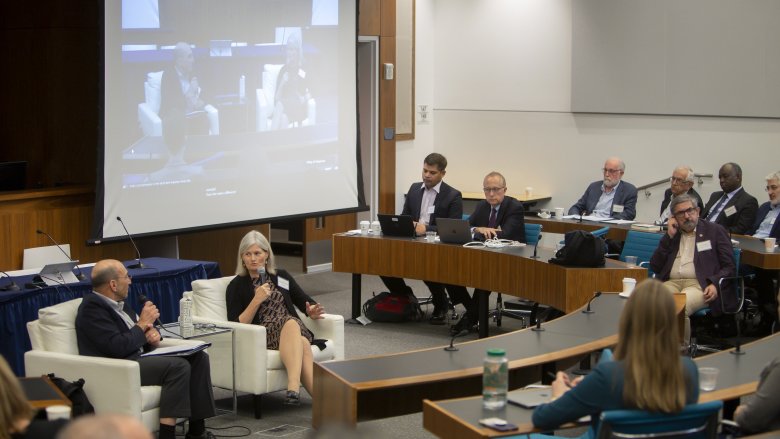An anniversary event allowed for assessment on the Panel’s history and future
By Ramanie Kunanayagam
The Inspection Panel, the first of the international accountability mechanisms, turned 30 this year. Thirty years of the Panel has dual significance as it marks 30 years of accountability among international financial institutions.
More than 100 practitioners, previous Panel Members and staff, academics, civil society representatives, members of the World Bank Board and senior management, and advocates with an interest in independent accountability mechanisms (IAMs) gathered at American University in Washington, D.C. in early April 2023 to celebrate the 30th anniversary of the World Bank Inspection Panel. The event was co-hosted by the Inspection Panel, the University of Pretoria, and the Washington College of Law, American University.
The anniversary event shed light on the ways in which the Inspection Panel has made a difference in World Bank operations over the years. It continues to hold the institution accountable to its own policies and standards, especially those related to the environmental and social aspects of projects. The Inspection Panel’s continual sharing of lessons learned from past cases has helped to shape the debate around how the World Bank can improve compliance with its policies and mitigate potential unintended harm to communities.
Participants at the event noted that the Inspection Panel has also increased transparency around projects that have been the subject of complaints. In his remarks to the assembled representatives, Ambassador Dominique Favre, World Bank Executive Director and Chair of the Board’s Committee on Development Effectiveness, stated that the Inspection Panel is an example of “bottom-up democracy at its best.”
Participants recognized that by continually operating with integrity, diligence, and respect for all concerned parties, the Inspection Panel has maintained its credibility and prestige, and ensured that its reports are taken seriously by World Bank Management and the Board of Directors. Many of those participating in the anniversary event cited the Inspection Panel’s unique ability to raise the concerns of marginalized and vulnerable communities to the highest levels of the organization. It was noted that Inspection Panel cases tend to be high profile and can bring new issues to the development agenda.
Reflecting on lessons learned
In addition to hailing the accomplishments of the Inspection Panel, the event provided an opportunity to reflect on the lessons learned from its first three decades, and to consider what may lie ahead.
Some participants, especially those from civil society working directly with project-affected communities, lamented that the continuous efforts undertaken to raise awareness of the Inspection Panel’s role, and how to file complaints, were falling short. This, they said, was especially true in poor, conflict-affected countries or regions where the activities of civil society are heavily restricted. In addition, the logistics of assembling a strong case for a legalistic process, uncertainty about the chances of achieving corrective action, and potential fear of reprisals by influential actors were mentioned as deterrents among some would-be complainants.
Support for broader mandate
Many participants commented that the Inspection Panel’s current mandate remains too narrow. A broader mandate could include the authority to initiate reviews, make case-specific recommendations, and monitor cases after a review has been concluded. It was noted that some other IAMs have such functions that can improve performance.
Looking into the future, participants imagined how the Panel’s work could (or should) change. The role of the Panel in a climate-dominated agenda was discussed. Some participants felt that borrower countries can be expected to demand more World Bank support to cope with increasingly frequent and severe natural disasters, food insecurity, and displacement. The Inspection Panel is likely to review cases where climate issues are raised, and where the responsibility of the World Bank to factor climate change into project design and implementation will be closely examined.
Another issue that has surged up the accountability agenda in international development is the threat of reprisals and retaliation targeting people who complain about development projects favored by influential interests, including in government. There is growing civil society demand for the World Bank and other development institutions to take a more assertive role in deterring threats against whistleblowers and project-affected communities defending their homes, lands, and livelihoods.
An idea regarding a ‘no-fault’ approach
One novel idea proposed is to dispense with attempts to ascertain where noncompliance occurred in cases considered by the Inspection Panel, and instead simply focus on providing redress for identified harm. This “no fault” approach to reviewing projects stimulated debate, including concerns that it would discourage learning from mistakes and adoption of institutional changes to prevent these mistakes from being repeated. As one participant argued, the World Bank should both provide remedy at the community level and accountability at the institutional level. Among other changes advocated by some participants was making Inspection Panel recommendations binding.
Kate O’Regan, the inaugural Director of the University of Oxford’s Bonavero Institute of Human Rights and a former judge of the South African Constitutional Court, delivered the keynote address at the anniversary event. She engaged with participants on the legal weight of findings made by IAMs, musing that there is a growing jurisprudence emanating from such mechanisms. Perhaps these findings are expanding the body of nonbinding international law?
In addition to imagining possible changes to the way the Inspection Panel will work, and the context in which it will operate, the anniversary event provided an opportunity to reflect on the first 30 years of its operations as well as to celebrate its achievements. The event captured the importance of the Panel’s place in history, the heavy expectations placed on it in terms of its mandate, reach, and delivery, and the continued need for the Panel to maintain its independence.
In 1998, then-World Bank President James Wolfensohn wrote: “The Inspection Panel is a bold experiment in transparency and accountability that has worked to the benefit of all concerned.” A quarter-century later, few seemed to disagree with those words.
Ramanie Kunanayagam is the Chairperson of the World Bank Inspection Panel.



